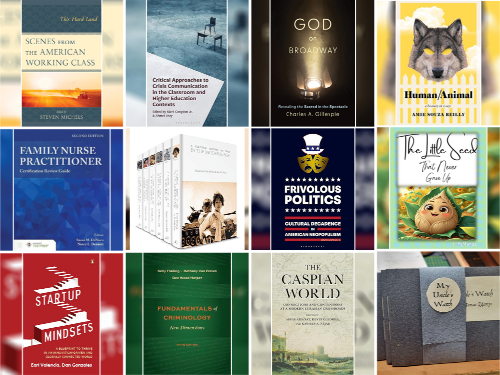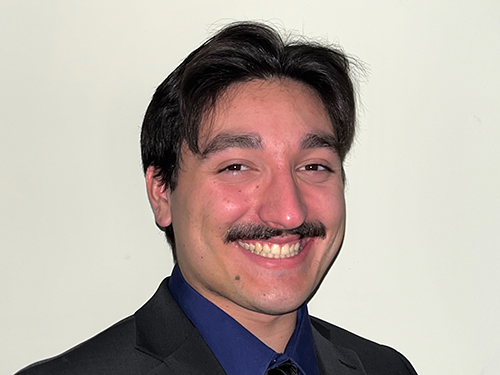
Minor in European Studies
Why Earn Your Minor in European Studies at Sacred Heart?
Enhance your understanding of modern Europe, with a focus on events from early modern Europe (1400-1800) or modern Europe (1800 to the present).
Coursework | 18 credits
The minor requires at least 3 credits in 4 areas where the study of Europe is the central aspect of the course:
- Political Science & Global Affairs
- History
- Economics or International Business
- Language or Literature
- Religious Studies & Philosophy
Political Science & Global Affairs
Investigates the philosophical foundations of political authority and social organization. Concepts such as freedom, equality, justice, and power are explored through engagement with primary texts.
A comparative analysis of several European political systems. Similarities and differences are explored with respect to governing structures, political culture, and patterns of political behavior.
An exploration of the legal frameworks and treaties that govern the relationships among states, transnational actors, and citizens. Students will analyze how global norms are created, enforced, and challenged in the face of conflict, crises, and emerging threats.
History
Traces the path of the French Revolution from its origins through each of its political phases from 1789 to 1799. It culminates with the rise of Napoleon Bonaparte, his achievements and failures, and the end of the empire in 1815.
Prerequisite: Take HI-100 or HI-102 or HI-110 or HI-115
Follows the political, economic, and religious developments from 1789 to the 1960s. It examines the last monarchy under Louis Philippe, the rise of democracy by 1848, numerous political factions, and World War I and II, culminating in the person of Charles de Gaulle. Attention is given to continuity and change to understand the character of France.
Prerequisite: Take HI-100 or HI-102 or HI-110 or HI-115
This course examines the history of the Low Countries through art and written texts from 1400 to 1850. It also compares and contrasts the development of Flemish and Dutch art and literature and shows how religion played an important part in the formation of early-modern Low-Countries' culture.
Prerequisite: Take HI-100 or HI-102 or HI-110 or HI-115
This course surveys Celts, from ancient continental European tribes through Medieval to modern Ireland. Focus will be on several debates on emotive events, such as Cromwell's conquest, Irish rebellions, the Famine, independence, culture, and identity.
Prerequisite: Take HI-100 or HI-102 or HI-110 or HI-115
This course examines collective memory in relation to official history and considers the place of landscape, tourism, poetry, and song as it reflects on Irish cultural identity.
Prerequisite: Take HI-100 or HI-102 or HI-110 or HI-115
This course will examine the history of the British Empire beginning with the earliest English explorations overseas and concluding with World War I and its impact on the future of imperialism worldwide.
Prerequisite: Take Hi-100 or HI-102 or HI-110 or HI-115
The history and culture of the Public House as one of the most important Irish institutions in Ireland. Irish culture has centered around three institutions: church, local GAA sports club, and the pub. The pub is where discussions, stories, and great 'craic' (fun) was experienced. With smaller homes and lack of many modern conveniences, pubs offer social spaces for sharing community knowledge and friendship, conducting business, playing music, and discussing politics. Well beyond alcohol, the atmosphere, warmth and friendliness are a well-known aspect of Ireland; the 20th century has exported pubs around the world. Ireland has also excelled at brewing excellent ales, beers, and the word whiskey comes from the Irish 'uisce beatha' or water of life.
Prerequisite: Take Hi-100 or HI-102 or HI-110 or HI-115
Economics or International Business
This course examines basic theories of international trade, modern trade policies, and international finance. It overviews the changing global business patterns, with a special focus on new economic and regulatory policy challenges in the aftermath of the first global recession of the 21st century. Students who master the course material will gain knowledge and skills for succeeding both in the public sector institutions and in international business organizations.
Being able to work well with people from other cultures, both outside and inside your country, is vital in the changing global environment. Cultural sensitivity and awareness of different perceptions, values, and traditions are important individual skills. Many people identify with more than one culture, adding to the complexity of cross-cultural relations. In this course students learn to be alert to possible cultural differences. Students come to understand these differences and learn not to rely on self-referential criteria.
Surveys the scope of international business with special emphasis on various environments including political, economic, legal, technological, and sociocultural. Also discusses the managerial process of planning, organizing, controlling, and leading in a global context and its application to achieve success in international business.
Prerequisite: Take MGT-101 or BU-201
Language or Literature
British Authors pre-18th century will be studied e.g. Shakespeare, Spenser, Milton, Marlowe and others.
Prerequisite: Take ENG-221
Major works of British poetry and prose, beginning with Old English and Beowulf and expanding through the literature of the Middle Ages with special emphasis on Chaucer and Elizabethan poets. Some drama, exclusive of Shakespeare, is included.
Prerequisite: Take FYS or FYWS 125
Explores a wide variety of plays from a literary as well as a theatrical perspective, with emphasis on Shakespeare's development as a dramatist and the relationship of his plays to their historical and cultural context.
Prerequisite: Take FYS or FYWS 125
Examines the works of Jonson, Donne, Herbert, Marvell, some of the lesser-known metaphysical and Cavalier poets, and Milton. Prose writings of Browne, Burton, and Bunyan are also studied.
Prerequisite: Take FYS or FYWS 125
Dryden, Pope, Swift, and Johnson are read, as well as Restoration dramatists (Congreve, Etherege, Wycherley) and early novelists (Defoe, Richardson, Fielding).
Prerequisite: Take FYS or FYWS 125
Emphasis on the literature written during and immediately after the French Revolution and England's ensuing war with France. The relationship between the individual and political, social, and intellectual environments is studied. Blake, Wordsworth, Shelley, and Keats are read.
Prerequisite: Take FYS or FYWS 125
Explores the literature of Tennyson, Browning, Arnold, Dickens, Eliot, Newman, Ruskin, Pater, Swinburne, and others. Focuses on major writers of the period (1830-1901) beginning with the poetry and concluding with studies in the Victorian novel.
Prerequisite: Take FYS or FYWS 125
Addresses modernism as it is shaped and constructed in the classic texts of Conrad, Woolf, Yeats, Joyce, Lawrence, and others.
Prerequisite: Take FYS or FYWS 125
Course description varies each time the course is offered.
Prerequisite: Take FYS or FYWS 125
This course introduces students to the richness of Irish tradition from the Irish Revival to new Irish writing.
Prerequisite: Take ENG-201
This course will explore Ireland's major dramatic movements, events, themes, and controversies, from the founding of the Abbey Theatre to the riots against J.M. Synge's The Playboy of the Western World to a series of plays that address "the Troubles" of sectarian violence in Northern Ireland.
Prerequisite: Take ENG-201
This course explores identity through engagement with the work of Irish writers (both indigenous and diasporic) and students' own creative work. It will encourage interrogation of the concept of Irish writing through the practices both of "writing in Ireland," quite literally, and alternative forms of writing/authorship, such as song-writing, comic book-writing, filmmaking, and visual art.
A survey of representative literary texts from the Middle Ages through the seventeenth century. Discussion of historical and cultural context. Several literary genres (novel, poetry, drama, etc.) treated. Critical techniques introduced. Taught in French.
Prerequisite: Pre: FR-201 or FR-202
A survey of representative literary texts from the eighteenth century to the present. Discussion of historical and cultural context. Both canonical and lesser-known works in several literary genres (novel, poetry, drama, autobiography, etc.) treated. Critical techniques introduced. Taught in French.
Prerequisite: Take FR-201 or FR-202 or by placement
Promotes understanding of the history and culture of the French with emphasis on arts, politics, language, thought, and lifestyle. Readings, films, the visual arts, and music are incorporated. Audiovisual and/or technological materials incorporated into class. Taught in French.
Prerequisite: Take FR 201 and FR 202
Content varies. Promotes understanding of Francophone peoples through their histories, cultures, politics, religious beliefs, and lifestyles. Readings, films, the visual arts, and music are incorporated. Taught in French.
Prerequisite: Take FR-201 or FR-202
Focuses on commercial French style and cultural aspects of business life in France and the Francophone world. Emphasis on commercial vocabulary and idioms most used in business situations. Taught in French.
Prerequisite: Take FR-151
Content varies. Comparative course focusing on historical and cultural connections and contrasts between France and Italy. May treat particular period (war years, contemporary times). Can include literature, film, music, and the visual arts. Taught in English with language-specific assignments for foreign language students.
Prerequisite: Take FR-201 OR FR-202 ;
Focuses on culture of Paris through art, history, literature, music, film, and popular culture. May treat particular period (Paris during the Revolution, contemporary Paris). May include issues such as Paris as cultural center, expatriates in Paris, and the future of the city. Taught in French.
Prerequisite: Take FR-201 or FR-202 or by Placement
Focuses on Quebec region in its historical and cultural contexts. Includes issues such as national identity, language, and the relationship to France. Taught in French.
Prerequisite: Take FR-201 or FR-202 or by Placement
Treats literary representations of travel, exile, and expatriation. Emphasis on works in a variety of genres including novel, autobiography, and letters. Issues include life abroad and life in exile, bicultural and multicultural identity, displacement and subjectivity, bilingualism, and confrontations with foreign cultures. May treat specific period.
Prerequisite: Take FR-201 or FR-202 or placement
Treats literary works by French and Francophone women in a variety of genres including novel, autobiography, drama, poetry, and letters. Discussion of feminist literary criticism and theory. May treat specific period.
Prerequisite: Take FR-201 or FR-202 or placement
A survey of representative literary texts from the Middle Ages through the seventeenth century. Discussion of historical and cultural context. Several literary genres (novel, poetry, drama, etc.) treated. Critical techniques introduced. Taught in Italian.
Prerequisite: Take IT-201 or IT-202 or placement
A survey of representative literary texts from the eighteenth century to the present. Discussion of historical and cultural context. Both canonical and lesser-known works in several literary genres (novel, poetry, drama, autobiography, etc.). Critical techniques introduced. Taught in Italian.
Prerequisite: Take IT 201 or IT 202 or by placement
Promotes understanding of the history and culture of Italians with emphasis on the arts, politics, language, thought, and lifestyle. Readings, films, the visual arts, and music are incorporated. Audiovisual and/or technological materials incorporated into class. Taught in Italian.
Prerequisite: Take IT 201 or IT 202 or by placement
Content varies. Comparative course focusing on historical and cultural connections and contrasts between France and Italy. May treat particular period (war years, contemporary times). Can include literature, film, music, and the visual arts. Taught in English with language-specific assignments for foreign language students.
Prerequisite: Take IT-201 OR IT-202 or by placement
Treats literary representations of travel, exile, and expatriation. Emphasis on works in a variety of genres including novel, autobiography, and letters. Issues include life abroad and life in exile, bicultural and multicultural identity, displacement and subjectivity, bilingualism, and confrontations with foreign cultures. May treat specific period.
Prerequisite: Take IT-201 or IT-202 or placement
Treats literary works by Italian women in a variety of genres including novel, autobiography, drama, poetry, and letters. Discussion of feminist literary criticism and theory. May treat specific period.
Prerequisite: Take IT-201 or IT-202 or by placement
History and culture of the Spanish people from their origins to the present day with emphasis on their arts, thought, and lifestyle.
Prerequisite: Take SP 201 and SP 202
The study of modern prose literature from Spain, in the Nineteenth and Twentieth Centuries.
Prerequisite: TAKE SP-201 AND SP-202
Religious Studies & Philosophy
Modern philosophy explores the works of 17th and 18th century thinkers such as Descartes, Spinoza, Cavendish, Locke, Berkeley, and Hume. This era is the birth not only of many philosophical questions still alive today, but also of the scientific revolution. Of specific interest to these thinkers are questions about the limits of human knowledge, the nature and capacity of the human mind, and the relationship between reason, faith, and scientific inquiry.
The philosophical traditions from Germany, from Leibniz in the seventeenth century through contemporary writers.
Prerequisite: Take a 3 credit Philosophy course
Traces the history of the Christian faith from the New Testament period to the Middle Ages. Major issues, controversies, and persons from these centuries are studied.
Traces the history of the Christian faith from the Middle Ages to the present time. Major issues, controversies, and persons from these centuries are studied.
A theological and phenomenological exploration of beliefs, practices, and symbology of Islam, incorporating extensive readings from the Qur'an, the Hadith and Shari'a, and Sufism. This course analyzes contemporary topics such as religion and gender and religion and politics.
Key components of the complex religion of Judaism including Biblical foundations, historical development, theological considerations, rituals and symbols, calendar and holidays, Jewish mysticism, prayer, denominations, and lifecycle events. Explores the role of God in the life of Jews past and present and compares the meaning of Judaism then and now.
The mythic history of Ireland and "beginning" of the Irish and the traditions by which the Irish have come to identify themselves and give meaning to their world. Study of the religious function of social institutions; gods, goddesses, and ruling powers; holy places; feasting and sacrifice; spirits and ancestors; and the other world. Also considered is the role of women in these traditions and the continuation of "myth" in modern Ireland.
Examines complex factors involved in shaping religion in contemporary Ireland. The changing face of Irish religious sensibility is situated within such factors as Irish history, the major role of Catholicism in the culture, and the multicultural dimensions of twenty-first-century Ireland.
This course seeks to acquaint students with some of the religious perspectives active during what we might call the "Hellenistic-Roman" era. Although Christianity eventually rises to dominate the remains of the Roman Empire, in its infancy it is but one of many options from which ancient adherents could choose. This course examines some of those alternatives. Along the way we will encounter examples such as the various "mystery" religions, Neoplatonism, theurgy, and Gnosticism. By means of engagement with primary source readings we hope to gain some insight into how practitioners of religious perspectives such as these understood the nature of reality and meaning.
Introduces the dimension of Christian faith often termed "the religious life." Studies the historical development of monasticism in the West and its various manifestations from late antiquity to the modern era.
Prerequisite: Take a 3 credit TRS course
Designates new or occasional courses that may or may not become part of the department's permanent offerings. Courses capitalize on a timely topic, a faculty member's particular interest, an experimental alternative to existing courses, etc. Prerequisites established by the department as appropriate for the specific course. Course title is shown on the student's transcript. Consult the current course schedule for available topics and prerequisites.
Prerequisite: Take 3 credits from TRS-100 level
Because the 18 credits are spread over four different areas, and due to major degree requirements, there may arise special cases where you may already have sufficient credits in an area. If this is the case, you can often substitute one course (3 credits) in a different area. This protects both the major and the minor from too many course overlaps. Course substitutions are based on the discretion of the Director of European Studies.
We also advise that you study a modern foreign language, as a sufficient understanding of foreign languages is an important part of this program. Therefore, three credits in language will only be accepted after completion of introductory-level courses.
More Information
The Latest in History
View More News-
 Academics, Faculty & Staff SpotlightPublished:Titles cover topics from crisis communication to the politics of the Caspian Sea
Academics, Faculty & Staff SpotlightPublished:Titles cover topics from crisis communication to the politics of the Caspian Sea -

SHU Junior Merges History and Medicine
Academics, Student Spotlight & OutcomesPublished:Health science student Matt Dworkowitz explores the birth of chemotherapy while preparing for medical school -

History Major Gains Insight into Politics
Academics, Student Spotlight & OutcomesPublished:Senior Fred Stiefel explores a future in politics through congressional internship with Rep. Mike Lawler

